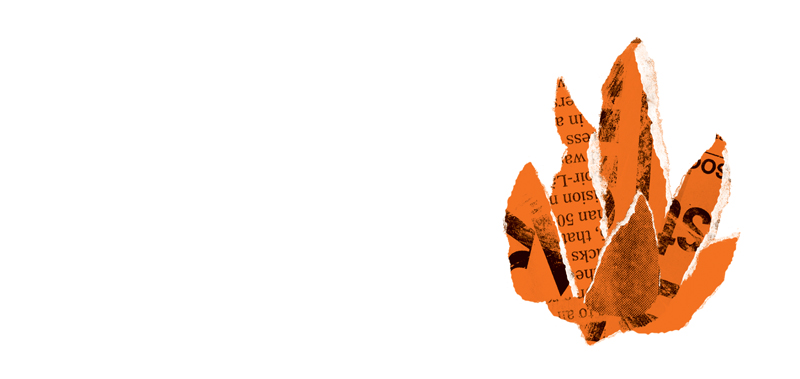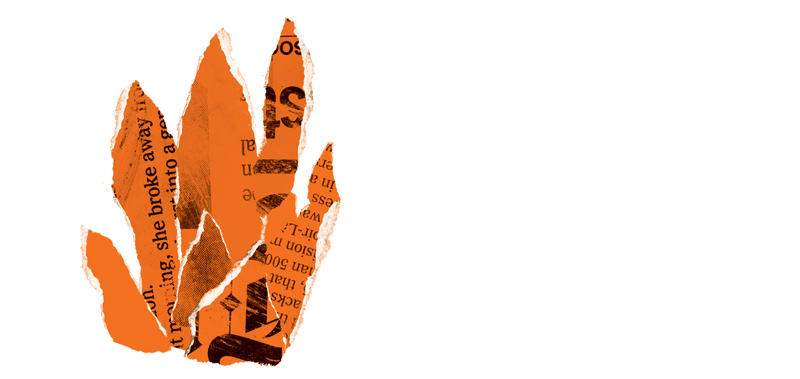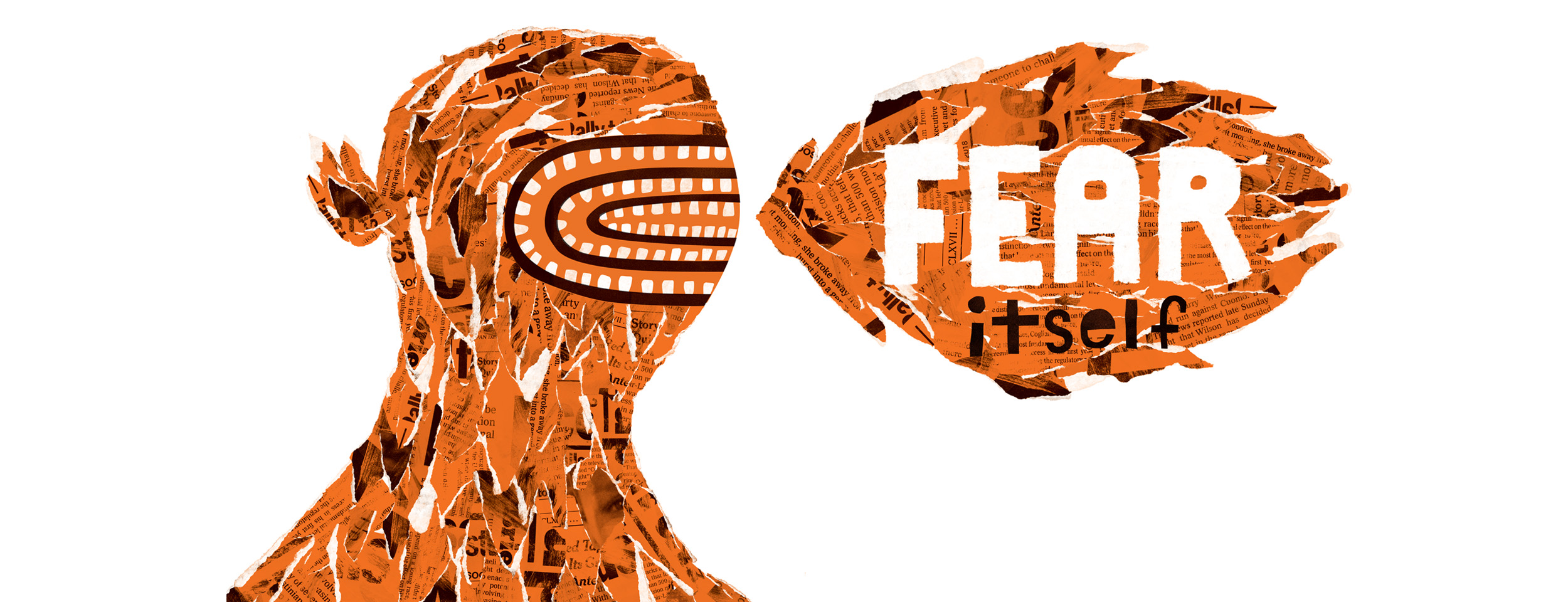For reporters, it’s surely as close to a Golden Rule as journalism affords: Fear nobody and nothing in your quest to unearth hard truths and afflict the powerful.
Donald Trump’s once-unimaginable matriculation into the White House has given journalists a historic opportunity to demonstrate this fearlessness. A fair number of reporters, editors, and opinionators have risen nobly to the occasion—partly with their investigative work, partly by learning to call politicians liars without qualification when they lie, and partly by playing their traditional role as the Paul Reveres of modern democracy, sounding the alarm when foes of freedom come into view.
ICYMI: An ongoing feud between two media goliaths
We are certainly raising a racket. The casual dishonesty of the administration’s press relations has become an unlikely First Amendment cause célèbre. Even the most cautious and careful luminaries of mainstream journalism were moved to issue loud and sometimes apocalyptic warnings when the president unleashed his most comprehensive denunciation of the press thus far during an August speech in Phoenix where he defended his “both sides” remarks on Charlottesville, characterized journalists as “dishonest,” “sick,” and “bad,” and blamed them for fomenting racial divisions and “trying to take away our history and our heritage.” Fox News Sunday host Chris Wallace called it “the most direct, sustained assault on a free press in our history.” “This was incitement, pure and simple,” agreed ABC Senior White House Correspondent Cecilia Vega. “Whether POTUS means it or not, I don’t know,” said Meet the Press moderator Chuck Todd, “but this could motivate a crazy.” Trump’s rhetoric is “poison,” said CNN’s Brian Stelter. “His attacks seep into the country’s bloodstream.”
The blowback to Trump’s speech was furious enough that far-right outlets parodied the “snowflakes” of the Fourth Estate with considerable relish. (Breitbart collected the most outraged responses under the snarky headline “Establishment Journalists Fear for Their Lives After Donald Trump Criticism.”) While it is true we are not sliding toward the suspension of press freedoms anytime soon, Trump’s relentless—and depressingly successful—attempts to vilify the media must be condemned for the unique danger they represent to a free and unafraid press. There’s a reason the word “existential” is now permanently clamped on to any mention of the crisis American journalism is facing. And there’s nothing overblown about wondering whether an independent, truth-telling press can endure in a country where the public has turned against it, learned to distrust it, and elected a leader who’d seemingly like to eviscerate it.
But our detractors and defenders share a blind spot: They fail to recognize that Trump is not the wellspring of journalists’ crippling angst. His election didn’t set the death of journalism in motion, and the end of his presidency, whenever and however it comes, won’t revive it. “Perspective is needed for those wailing that a tyrant will doom what’s left of journalism in America,” writes Ross Barkan in The Guardian. “The truth is far more banal and depressing.” And the truth is this: “Financial woes pose a far greater threat to the news industry than anything Trump says or does. Journalism today is dying because no one has really figured out how to financially support it in a winner-take-all capitalist system.”
It’s hard to argue this point. There are many good reasons why “newspaper reporter” and “broadcaster” top so many lists of the worst jobs in America; they are all rooted in the broken economics of the profession. Toward the end of 2017, I talked with several of my favorite truth tellers in the trenches of national journalism—award-winning reporters and writers who specialize in doing the kind of work that doesn’t come with superstar salaries or cable-news contracts—about what scares them most about practicing journalism in the age of Trump. The one answer I never got was, “Donald Trump.”
The more these journalists talked, the clearer it became that the malaise goes much deeper than the usual laments: the low pay, the ridiculous hours, the incessant demands for clickbait, the constant threat of doxing and trolling, the fact that your outlet could pivot to video tomorrow without warning. The fear grows out of a confluence of factors: economic, cultural, political, and yes, existential. And it cuts straight to the core of why people dedicate their lives to journalism in the first place.

“I’ve been reporting on the far right since the 1980s,” says Adele Stan, a former Mother Jones reporter who writes a column for The American Prospect. “I am not easy to scare. Or even to faze.” But the Trump campaign rallies she covered in 2016 rattled her. “You’re in an arena, in a cage, like you’re some kind of zoo animal, and people are yelling Lugenpresse! at you. It’s not like you can actually report anything. You’re just there to be abused.”
While they sometimes pretend to ignore it, many journalists have found themselves profoundly disheartened by the steady stream of public and presidential hostility. After the election, Stan landed a plum assignment: Reporting on a fracas in Whitefish, Montana, where local activists who had tried to run neo-Nazi leader Richard Spencer’s mother out of town found themselves inundated with threats from extremists. This was Stan’s kind of story, but for the first time she could recall, she had qualms. “You start thinking things like, ‘Am I doing this work for the right reasons? Am I putting people I love in danger because of this? Am I doing it because I’ve made it part of my identity, or because it’s actually important?’”
One reason Trump’s attacks sting is that journalists don’t just feel their livelihoods are on the line, they also believe there’s something larger at stake. “Journalism, at its essence, and at its best, is not merely a profession or a career,” cultural critic Lee Siegel wrote in February 2017. “Rather, it is the way people who practice it fulfill their destiny in their work.” When Trump propagandizes about the evils of the free press, he is “targeting people’s identities,” in Siegel’s words. “He is imperiling the way they have worked out a manner in which to live.”
Trump’s election didn’t set the death of journalism in motion, and the end of his presidency won’t revive it.
If the definition of living under authoritarianism is being in a state of perpetual uncertainty, engaged in a blind daily struggle to survive, Stan—who’s now working a communications job while writing her columns—says journalists are “a lot closer to experiencing that already” than most Americans. “Had Donald Trump not been elected, there’d still be plenty of fear in the journalism business because of the contortions it’s going through,” she says. “Now you have this neo-authoritarian demonizing journalists at the same time we’re already walking a tightrope just to stay employed.”
Nobody needs a reminder of the grim statistics: the gutting of the nation’s newsgathering force, the fall in once-decent compensation to well below the national median, the growing ranks of “independent journalists” who can’t pay their bills. Long before the idea of a Trump presidency became real, there was truth to Barbara Ehrenreich’s lament that “in America, only the rich can afford to write about poverty.”
ICYMI: Right-wing media goes crazy over 6-word “bombshell”
But walking a perpetual financial tightrope certainly isn’t the sole reason so many American journalists live in a state of fear, or why at least 80 percent experience trauma on the job, or why just 23 percent of journalists even like their jobs. “Sometimes, the whole thing really feels like a game of musical chairs,” says Gabriel Arana, a former senior editor at HuffPost and Mic who now freelances for a variety of outlets. “All you care about is not being the one left standing. So you’ll do any kind of clickbait they want you to, even if it’s killing you inside. To even think about meaningful work at most websites feels like a luxury.”
Eric Garcia, a Roll Call reporter who’s had three jobs in the three years since graduating from UNC Chapel Hill, knows that ever-present sense of dread. When he goes back to Chapel Hill and talks to students, he finds himself rattling off cautionary notes. “I say, ‘You’re going to have to love the news part of the business enough to put up with the business part of the business.’” And the “business part,” he warns them, often dictates the journalism part. “Every day you have to validate your existence. You have to churn out content fast,” Garcia says. “But you also have to be ambitious. You feel like every day you need to be breaking stuff, because otherwise you’re on the chopping block.”
When he was interning for a national magazine in Washington, DC, an older colleague once gave Garcia a friendly word of advice. These days, she said, journalism is a “war of attrition.” Only those with inherited wealth, or the strong stomach and nerves to live with constant uncertainty and self abasement, could survive. It sounded cynical to him at the time, but it’s “100 percent true.”
“You have this neo-authoritarian demonizing journalists at the same time we’re walking a tightrope just to stay employed.”
Journalism has always been an anxiety-fueled profession, of course, running on a combination of caffeine, booze, and deadlines. But now there seems to be a new source of nightmares: If you’re not losing sleep over keeping your job, or figuring out how to make a client pay up, you’re fretting about mistakes. The warp speed of the digital news cycle makes errors impossible to avoid. Systems that used to prevent embarrassing or career-ending screw-ups—research, fact-checking, and copyediting departments—have been gutted, and writers are often expected to be their own checks and balances.
“My first job in journalism was as a fact checker,” says Nora Caplan-Bricker, a former staffer at The New Republic and National Journal who now reports freelance on gender issues. “But since I started writing my own stories, I can count on one hand the number of times my facts were checked. It takes me days to do it myself, for a feature story. That’s somebody else’s job; I don’t get paid to do it. But how can you not?”
Trump’s war on journalism has ratcheted up the anxiety responsible reporters like Caplan-Bricker feel when they publish a story. “The pressure has never been higher—to not make any mistakes, to prove that this is a real profession and not partisan hackery. The 48 hours around my stories going up are horrible,” says Caplan-Bricker. “And social media makes it a lot worse. A minuscule error might bring down this horrific avalanche on you.”
Even for male journalists, who are far less likely to experience the worst kind of avalanche than women, the prospect can be daunting enough to change your mind about what kind of writer you want to be. “It used to be my goal to be among the most high-profile journalists,” says investigative reporter Barry Yeoman, who’s freelanced successfully full-time for more than 15 years from his home in Durham, North Carolina. “That goal gets tempered when I see what the social media snake pit does to some of the highest-profile journalists. I am a very diligent reporter, and yet I have seen equally diligent journalists get eaten for lunch, for writing decisions they’ve made that—right or wrong—were made in good faith. I do feel like all of us are just one misstep away from the snake pit.”

Looming darkly over this snake pit is Donald Trump, who simultaneously inspires existential fears and challenges the fighting spirit of reporters and editors. Journalism has always attracted the kinds of people who are stubbornly resistant to authority, and who tend to believe fiercely in the righteousness of what they do. “If you’re drawn to the work for the right reasons, it’s like EMS people who are drawn to save lives,” says Stan. “You can’t stop people who are made that way from running to the danger.”
You also can’t stop them from wondering, increasingly, whether it’s all truly worth the sturm und drang. “The ultimate fear, above all the rest, is that nothing you write will make a difference,” Stan says.
That fear of irrelevance has been stoked by Trump’s fake news mantra. “Maybe it was always naïve to believe that journalism and telling the truth was going to save the world,” says Arana. “But now you have to wonder if the facts, or reality, can ever matter. We are competing with propaganda, and propaganda is winning.”
To some degree, the high pitch of Trump-era politics has allowed journalists to set these larger anxieties aside. “Trump has given people a sense of moral mission,” Arana says. “And he’s right when he says he’s great for ratings. He’s created a lot of jobs. His lies require armies to debunk and defend. But what happens when he’s gone?”
For all the justifiable jitters that journalists have about the havoc President Trump might wreak on press freedoms—and on the respect for facts and truth—the reality is that a hard situation for journalists will only become harder when he is gone. The “Trump bump” in traffic and audience will likely melt away, taking jobs with it. The media may ultimately bring down a corrupt president, but few journalists will be able to feed their families on it.
It may be that journalism emerges from the Trump era with a reputation that’s revived; polls show that reporters are, at least, considered far more honest than Trump, small comfort though that is. While a bit of journalism’s sheen might be restored by the time Trump is through, the malaise will linger. Trump’s derision hasn’t just seeped into the public consciousness; it’s worked its way into journalists’ bloodstreams, too. Take bad economics, mix in the devaluing of journalism as a profession—both from within and without—and the downgrading of truth in American culture, and you have a recipe for despair. There’s a growing impetus for our best journalists, now and in the future, to write off the profession entirely and opt for a life that’s relatively sane.
The day after Trump leaves office, reporters will no doubt wake up with a spring in their collective step, feeling lighter. But their working lives won’t be easier; if anything, they’ll be more challenging. The industry’s churn cycle is nowhere near finished; the same old worries will pile on top of other worries, the same fears on top of fears. Only the cloud of Trump will be gone. We’ll no longer have the president of the United States shaking his fist at us, goading us on to commit journalism, whatever the cost. What we will have is an industry full of trauma survivors, with further shocks in store.
Bob Moser is the former editor of the Texas Observer and executive editor of The American Prospect. He’s the author of Blue Dixie: Awakening the South’s Democratic Majority and is writing a book about misogyny in the alt-right.


